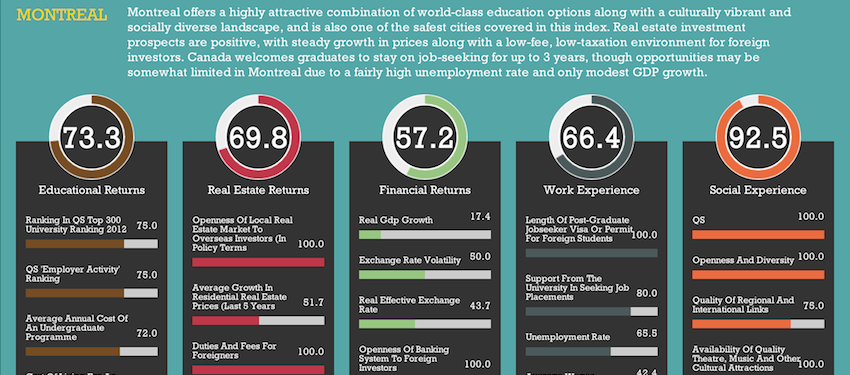Montreal in Canada provides the highest returns for international students seeking an undergraduate degree, according to a new index created by The Economist Intelligence Unit and China’s Bank of Communications.
 An extract from the website displaying the Sea Turtle Index
An extract from the website displaying the Sea Turtle Index Educational quality, top global institutions, financial returns, work opportunities and cultural diversity all play a part in the decision-making process and according to the Sea Turtle Index, studying in Montreal in bilingual Quebec is the overall best return on investment.
Named after the term used in China for students who have studied aboard and who are coveted by employers on their return, the Sea Turtle Index measured 80 cities for educational returns, real estate returns, financial returns, work experience and social experience.
“The quality of education at institutions in the city is important, but Canada’s welcoming immigration policies, offering good opportunities for employment after graduation, also make it an appealing destination,” the index’s creators said. “Its comparative openness to foreign investors and its cultural diversity also boost its attractiveness as a destination for international undergraduates.”
London’s educational returns and cultural diversity helped it reach second place, whilst Hong Kong’s openness to investment and high real estate returns ranked it in third.
Hong Kong was one of several of Asia’s more affluent cities to make the top 30.
Montreal’s southern neighbour Toronto followed closely in fourth place, attesting the success of Canada’s fragmented educational system where the ten provinces are held responsible for the quality of education, thus fuelling competition within the public sector. “There’s a very intense battle to maintain quality and for each province to have a good education system,” says Kenneth Wong, trade commissioner for education at the Canadian Embassy in Beijing.
“To find an equivalent concentration and quality of universities, you have to look at other cities which are much, much more expensive”
Other findings emphasise the importance of an “open environment” cushioning foreign students with welcoming immigration policies and a wealth of employment opportunities upon graduation.
Overall trends spoke to richer Asian cities scoring highly and the continent as a whole offering more “bang for the educational buck,” beating cities such as Boston, which houses elite institutions: Harvard and MIT.
“It wasn’t that surprising to us, actually, simply because Montreal has a few attributes that make it really attractive to students,” said Andre Costopoulos, Dean of Students at McGill University, where 20% of the student population is international.
“To find an equivalent concentration and quality of universities, you have to look at other cities, such as London or Boston, which are much, much more expensive,” he said.


